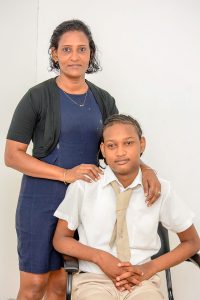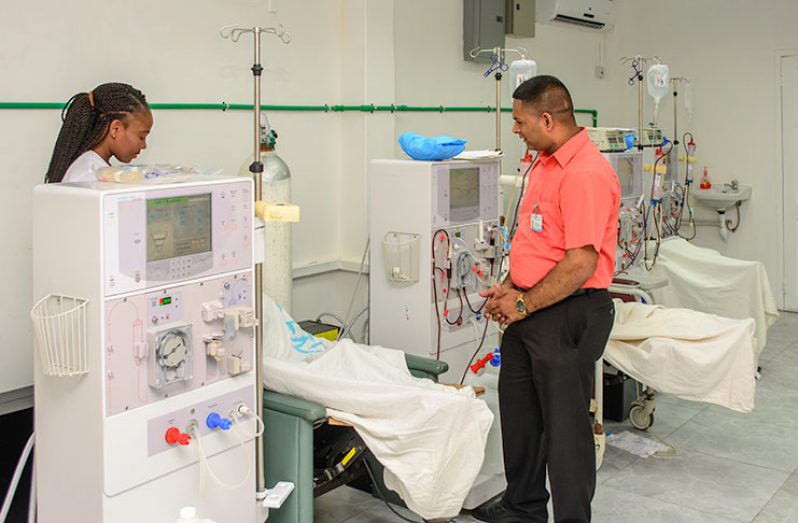WITH the exception of Sunday, approximately 20 to 25 patients with Stage Four and Five Kidney Disease receive life-saving Haemodialysis at the Dialysis Centre of the Georgetown Public Hospital (GPHC), but are they really getting the help they need?According to the Head of the Nephrology Department, Dr Kishore Persaud, the high influx of patients, coupled with limited dialysis machines result in many patients receiving less than the required three sessions of Haemodialysis per week.
A person with Stage 4 Chronic Kidney Disease (CKD) has advanced kidney damage while a person with Stage 5 Kidney Disease or Renal Disease is at the final stage where their kidneys can no longer function well enough to meet the needs of daily life, resulting in a build-up of toxins in the body.
Using a dialysis machine, the blood of a patient is filtered and restored to the body. The machine functions as a replacement for the kidney.

At the Dialysis Centre, which forms part of the Department of Nephrology, there are eight dialysis machines and according to Dr Persaud, they are all working.
“Seven would be working on a given day. Five patients would be dialysing continuously on five of the machines, while two of the machines would be on standby…. We use those two machines, if somebody comes off the street to dialyse them, so that we prevent the contamination of the other machines,” Dr Persaud explained during an interview with the Guyana Chronicle. The eighth machine is on standby in the event one of the other machines malfunctions.
The machines were donated to GPHC in July 2016 by the University of Vermont’s Medical School.
Though the Dialysis Centre is run by a component team of physicians, inclusive of a transplant surgeon, a nephrologist, a dietitian, a pharmacist, a social worker, five Government Medical Officers (GMOs) and eight Registered Nurses, he said the problem develops when the number of patients increases.
It was pointed out that many patients resort to the Government-run centre, where Haemodialysis is free, when experiencing financial difficulties or when private centres are experiencing technical problems.
In the private setting, Haemodialysis costs between $12,000 to $15,000 per session. It therefore means three sessions per week amount to $36,000 to $45,000 or approximately $180, 000 per month if the higher unit cost is applied.
“Georgetown Hospital cannot refuse to admit anyone of them. And we cannot discharge a patient without having a dialysis plan for them. If you come to the hospital and you require dialysis, we will treat you,” Dr Persaud assured.
Due to the severity of their conditions, some patients end up living in the hospital – a situation which creates a great burden on the Dialysis Centre, the Head of the Nephrology Centre said. Currently, there are eight live-in patients at GPHC, who require Haemodialysis.
“If we have 20 to 25 patients per day…. If you have more coming in, it tends to build up. The more patients that come in increases the strain on the centre because the machines are inadequate to serve that population,” he posited. He said too that the number of medical personnel attached to the centre is also insufficient to tend to the large population.
CHALLENGE
For patients, that “burden” means fewer sessions of Haemodialysis. “Now being admitted to GPHC may be doing more harm than good because when you have this large population of patients on the ward, and you have only a small amount of machines to service them, you can only give them what you have, so sometimes we dialyse a patient once a week instead of three,” Dr Persaud pointed out.
It was however explained that most times patients are given two sessions of Haemodialysis.
“You are not really giving them adequate dialysis. You are not really cleaning them, filtering the blood properly, so at the end of the day you have chronic uremia developing in these patients and so they become sicker and sicker,” he said.
Based on data collected by GPHC, there are approximately 120 patients receiving dialysis across the country at both public and private medical institutions.
Privately dialysis is offered at the Doobay Medical Centre, the St Joseph Mercy Hospital, the Woodlands Hospital, Balwant Singh Hospital and at the Five G Dialysis Centre.
Director of Five G Dialysis Centre, Selwin George told Guyana Chronicle that for the first time the centre approximately two weeks ago received a subsidised cheque from the Government for a patient to the tune of $360,000. The cheque will cover 40 sessions. The cheque was submitted to the Five G Dialysis Centre more than one year after the Doobay Medical Centre last received subsidy for patients, this newspaper was told.
According to George, the average cost of one session at his centre is $36,000 but do not stand the entire cost because the centre also offers financial aid to patients based on their financial situation.
He said that he is cognisant of the challenges facing the Government-run centre with regards to capacity, affordability and quality of treatment. To remedy the situation, George said the Five G Dialysis is willing to partner with the GPHC to provide dialysis at Government-run clinics.
“We will increase the capacity, lower the cost and provide better quality,” he said, noting that this proposal is not new to GPHC.
According to him, his centre will provide the required service for the “same amount of money or even less (than),” the Government is currently spending to operate the centre at GPHC.
But Dr Persaud said what is needed is a National Dialysis Centre with no less than 40 dialysis machines and an expanded medical team to treat patients. This approach, which was already put to the Public Health Minister, Dr George Norton, would need the support of all stakeholders, the Head of the Nephrology Department said.
“If you want patients to go back home and become productive citizens you have to get a proper dialysis centre that will dialyse them effectively,” he posited.
Additionally, he called for a greater investment in peritoneal dialysis – which is cheaper and can be done at home on a daily basis. It requires a minor operation to place a catheter in the abdomen (belly). With peritoneal dialysis, the blood is cleaned internally and not externally and does not require a dialysis machine as in the case of Haemodialysis. There are approximately 35 patients receiving peritoneal dialysis at GPHC.
“It is just as effective as the Haemodialysis. It is actually proven to have more benefits than Haemodialysis but all you need to get is the fluid and provide it for the patients,” Dr Persaud noted.
REDUCING DEPENDENCY
In the interim, the Nephrology Department is trying to increase the number of kidney transplants done at GPHC, thereby removing patients’ dependency on Haemodialysis or peritoneal dialysis.
In February 2017, GPHC will be teaming up with the University of Calgary to conduct four to five kidney transplants – surgical procedures that would result in the patients receiving healthier kidneys from donors.
Sixteen-year-old Tomol Mingo of Charlestown, who was diagnosed last January with Nephrotic Syndrome, is first in line to undergo the surgical procedure. His mother, 39-year-old Shaundell Fraser-Mingo will be donating her kidney.
“The surgery is much better than the dialysis because going and coming can be really fatiguing. Sometimes late in the night you have to stay up, taking out fluids, putting in fluids,” the 16-year-old told Guyana Chronicle. Subsequent to the batch of transplant in February, the hospital plans to conduct at least one transplant on a monthly basis.
In addition to the transplants, the University will train nurses and doctors at the Dialysis Centre to upgrade the level of Haemodialysis and Peritoneal dialysis as part of a project to develop ‘Kidney Care’ in Guyana.
According to Nephrology Department, to date 13 transplants have been conducted in Guyana, 10 privately and three at the public hospital. Of the three, only one patient died. The other two patients, this newspaper was told, are doing well.
In fact, 16-year-old Abigail Mars, one of the beneficiaries, is preparing for CSEC come 2017. The business student at St Joseph High School will be writing 14 subjects.
According to the World Health Organisation (WHO), population ageing, type 2 diabetes mellitus and hypertension, are major risk-factors for chronic kidney disease.



.jpg)









